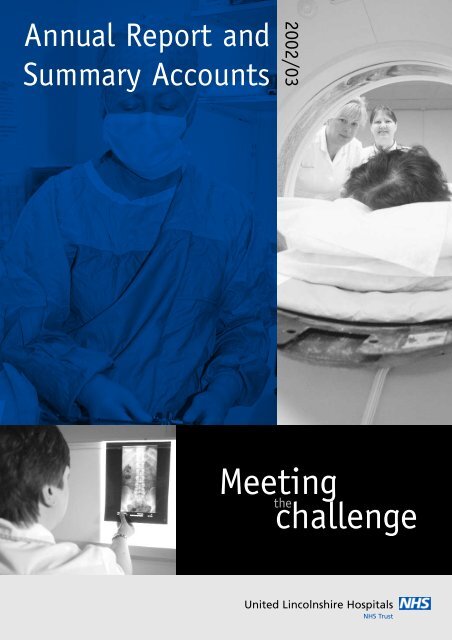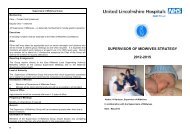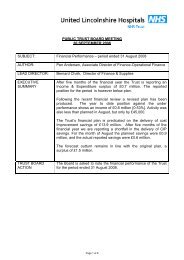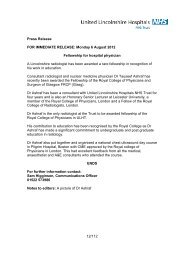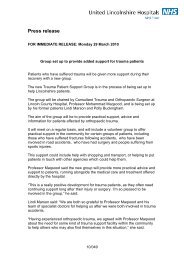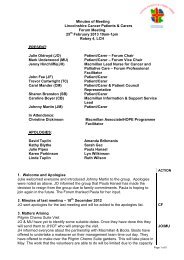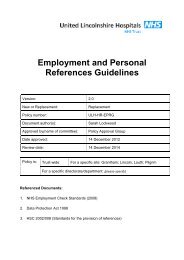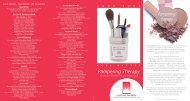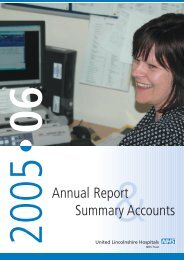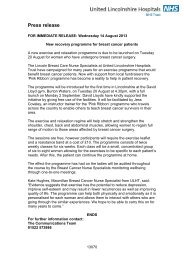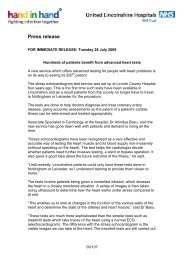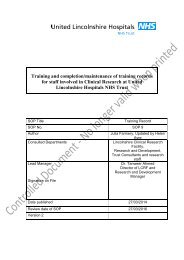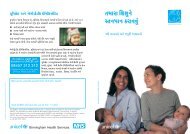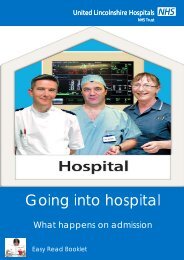2002-2003 (PDF, 1.6 MB) - United Lincolnshire Hospitals NHS Trust
2002-2003 (PDF, 1.6 MB) - United Lincolnshire Hospitals NHS Trust
2002-2003 (PDF, 1.6 MB) - United Lincolnshire Hospitals NHS Trust
- No tags were found...
Create successful ePaper yourself
Turn your PDF publications into a flip-book with our unique Google optimized e-Paper software.
At Louth we have invested £110,000 in informationtechnology providing a “high tech” computernetwork system and, in partnership with East<strong>Lincolnshire</strong> Primary Care <strong>Trust</strong> and Louth andDistrict Hospice, have developed a specialist respitecare facility.By the end of the year our planned transfer of themanagement of the community hospitals in Skegness,Gainsborough and Spalding to their respective PrimaryCare <strong>Trust</strong>s had taken place.We have been heartened by the response from patientsatisfaction questionnaires. We do not always get itright and sometimes receive complaints. We treat thesevery seriously and regard them as an opportunity tolearn and improve, so it is particularly heartening tosee that during the year our response rate tocomplaints has improved. Understanding the valuablecontribution that patients can bring to shaping theway we deliver our services, we successfully applied tobe one of the national pilot sites for Patient Forums.We have also continued to involve patients in supportgroups and special interest groups.During the year we had our first assessment by theCommission for Health Improvement (CHI). Theirreport highlighted a number of the difficulties the<strong>Trust</strong> had faced since the merger and has been auseful trigger for an action plan that will ensure highquality clinical governance and its associated constantimprovement in the way we care for patients.Formulating and implementing this plan has been oneof the identified top three priorities for the <strong>Trust</strong>. Theother two are steering the <strong>Trust</strong> into a more robustfinancial position and, together with our <strong>Lincolnshire</strong>health care partners, developing an acute servicesstrategy – Keeping Our <strong>NHS</strong> Local. This <strong>Trust</strong> wasformed to provide high quality clinical care withequal access for all and the strategy strives toachieve this.New technology, modernisation of the delivery ofhealth care, enhanced patient expectations and theever increasing pressure on resources means that ourstaff have to adapt the way we perform and the waywe treat and discharge patients. To achieve thesechanges requires a considerable investment in trainingand education. We provide a structured learningopportunity to over 200 doctors in training and morethan 300 student nurses, midwives and other healthcare professionals. Of special note was ourachievement of more than 300 new registrations forNational Vocational Qualifications which support theworkforce without professional qualifications. We areblessed with loyal and hard working staff who areundoubtedly our greatest asset. We appreciate thatthe severe financial pressures have made life difficultfor many and we appreciate how they have respondedto the challenge.We also owe a great deal to the dedication of ourvolunteers. The <strong>Trust</strong> currently has many volunteershelping in lots of different ways. We are alsoindebted to all those individuals and organisationswho contributed to supporting our charitable funds.Money raised in this way has enhanced the care weare able to provide by enabling us to purchasespecialist equipment and add benefits to patient careat all of our hospitals, and has also supportedresearch into diseases such as cancer.During the year we have had some changes inpersonnel as people have taken up opportunities toprogress their careers elsewhere. In May <strong>2003</strong> DavidLoasby, our former Chief Executive, left the <strong>NHS</strong> topursue a career in the private health care sector.During the last three years David had devoted himselfto the <strong>Trust</strong> and there were significant developmentsacross the sites under his leadership. I am happy toannounce that Roger Paffard was appointed ChiefExecutive and joined the <strong>Trust</strong> in August <strong>2003</strong> andthat John Willetts was appointed Interim ChiefExecutive from May to September <strong>2003</strong>.Finally we should like to record our thanks to allour staff, each of whom contributes in a unique way.Jenny Green OBEChairmanAnnual Report and Summary Accounts <strong>2002</strong>/033
<strong>Trust</strong> Objectives <strong>2002</strong>/<strong>2003</strong>● Developing the acute services strategy in <strong>Lincolnshire</strong>The <strong>Trust</strong> and its partner organisations across the healthcommunity published the draft acute services strategyconsultation document “Keeping our <strong>NHS</strong> Local” in line withthe project time-scales.Patients speak out“This has been my first timein and staff have all beenbrilliant and supportive”.M Walters“Thank you for makingmy stay in hospital apleasant one”.J Short“Many thanks for lookingafter me so well. I couldalmost say it was a pleasureto be there!”.M Mutch● Achieve national targets to reduce the length of timethat patients waitThe <strong>Trust</strong> met or bettered all the targets for waiting times.This included the national guarantee of maximum waits of12 months for inpatients and 21 weeks for outpatients. The<strong>Trust</strong> saw a significant reduction in the number of patientson the waiting list and a consistently high percentage ofpatients were seen within two weeks of referral forsuspected cancer.● Manage winter pressuresThe <strong>Trust</strong> completed an escalation plan to ensure that it wasable to respond effectively to winter pressures. By March<strong>2003</strong> over 92% of patients were admitted, discharged ortransferred from A & E within four hours. To sustain andimprove performance further, a major project was started todevelop and reform all aspects of emergency care.● Meet financial targetsThe <strong>Trust</strong> met all its statutory financial targetswith planned financial support from Trent StrategicHealth Authority.ImprovingWorking LivesPrisca Furlong, Team LeaderWaiting Lists Louth hasreduced her hours from 37 to30, now taking Fridays off.This was done for healthreasons and Prisca says hermanager, Andrea Blakeley, wasvery receptive to the idea.When asked how the workthat used to be done onFridays was now coveredPrisca says: “The work iscovered with the use of ananswerphone on Fridays forme to pick up messages onMondays and by me using verycareful prioritisation. I findthis works fine”.4 Annual Report and Summary Accounts <strong>2002</strong>/03● Improving quality by ensuring the principles forclinical governance are achieved across the <strong>Trust</strong>Clinical governance arrangements have been implementedand improved across the <strong>Trust</strong>. The Board’s leadershiphas been improved through the establishment of anintegrated Clinical Governance Sub-Committee and robuststructures have been implemented at divisional anddirectorate levels.The clinical effectiveness unit introduced a mechanismto ensure implementation of National Institute forClinical Excellence (NICE) guidance. The <strong>Trust</strong> hascontinued to implement the standards set out in “Your Guideto the <strong>NHS</strong>”.
●Continue to implement the Government’s <strong>NHS</strong> Plan andto modernise servicesThe <strong>Trust</strong> has continued to take account of <strong>NHS</strong> Plan targetsacross divisions and directorates and these have beenincluded in the <strong>Trust</strong>’s service planning process. The <strong>Trust</strong>has continued to be proactive and involved in “Action On”orthopaedics and the Orthopaedic Collaborative and wassuccessful in gaining “Action On” orthopaedic capital for aspecialist theatre at Pilgrim Hospital. Progress was also madein respect of “Action On” ophthalmology and “Action On”dermatology. In urology and general surgery similarmodernisation schemes have helped to achieve performancetargets. The <strong>Trust</strong> has continued its commitment to involvingpatients and carers in the development of the <strong>Trust</strong>’s servicesby supporting the establishment of a Pilot Patient Forum.● Ensure capital schemes proceed on time and budgetThe Pilgrim façade scheme remained on schedule. Theemergency medical admissions unit at Lincoln was completedin 16 weeks and replacement of old-style Nightingale wardsat Grantham and Lincoln continued to make progress.The Outline Business Cases for critical care at Lincoln, theSouth Holland Project (a new hospital for Spalding) and theupgrade and rationalisation of <strong>Trust</strong>-wide sterile services anddisinfection units were progressed. The modernisingradiology project at Lincoln was superseded by the <strong>Trust</strong>purchasing significant amounts of radiology equipment.● Develop cancer servicesThe <strong>Trust</strong> continued to work closely with the Mid-Trent CancerNetwork in developing plans to ensure that key cancer targetswere met. A third linear accelerator (a specialist machineused to treat cancer with radiation) was integrated into theservice as planned.● Manage the information management and technology(IM&T) programme as part of the strategy to deliveran electronic patient record (EPR) by 2005The <strong>Trust</strong> has worked hard to achieve national IM&T targets,such as the implementation of a system to support the issueof <strong>NHS</strong> numbers to babies.In particular the <strong>Trust</strong> has prepared itself for the introductionof the electronic patient record. Staff from all areas havedesigned new ways of working and continue to prepare forthe introduction of the electronic patient record.● Manage the <strong>Trust</strong>’s estate and facilities to supportpatient careThe <strong>Trust</strong> implemented plans to achieve the installation ofpatient entertainment systems in all hospitals by March 2004.The <strong>Trust</strong> piloted the new ward housekeeper role onfour wards which brought significant improvements topatient satisfaction.A <strong>Trust</strong>-wide travel plan was completed by March <strong>2003</strong> toassess future needs.Facts and figuresThe <strong>Trust</strong> continues to provide hospital care on nine sites:● County Hospital – Louth● Grantham and District Hospital● Johnson Hospital –Spalding(managed by East <strong>Lincolnshire</strong> Primary Care <strong>Trust</strong>)● Welland Hospital – Spalding(managed by East <strong>Lincolnshire</strong> Primary Care <strong>Trust</strong>)● Lincoln County Hospital● Pilgrim Hospital – Boston● John Coupland Hospital – Gainsborough(managed by West <strong>Lincolnshire</strong> Primary Care <strong>Trust</strong>)● St George’s Hospital – Lincoln● Skegness and District Hospital(managed by East <strong>Lincolnshire</strong> Primary Care <strong>Trust</strong>)Number of patients treated<strong>2002</strong>/<strong>2003</strong> 2001/<strong>2002</strong>Planned inpatients 16,634 17,103Day cases 40,782 40,666Emergency inpatients 81,165 77,494New outpatients 114,516 119,699Follow up appointments 328,784 329,515The total income for the <strong>Trust</strong> was £240 million. This included£3.15 million of planned revenue support from the StrategicHealth Authority, which enabled the <strong>Trust</strong> to achieve itsstatutory duty to break even.Further details and Summary Financial Statements are includedon pages 16-17.Annual Report and Summary Accounts <strong>2002</strong>/035
Managing our waiting listsPatients speak out“Care, from admission todischarge, was of thehighest standard. Everyonewas so kind, efficient andcheerful, and we know hecould not have been nursedbetter anywhere”.A, E, & G Moulds“I have nothing but praise forone and all”.J Brewer“I couldn’t have been inbetter hands”.P CredlandImprovingWorking LivesClinical secretary WendyFielding recently returned towork after maternity leave.Just before she came back towork she decided that fulltime hours would not suit hernow that her circumstanceshad changed. Wendycontacted her manager, TeresaBrown, and between themthey worked out a job sharescheme with the secretarywho had covered Wendy’smaternity leave. Wendy says:“My manager and mycolleagues were all great;supportive and veryunderstanding. I can`t beginto tell you what a differenceit has made to have suchsupport and flexibility. All ofthis has made my return towork a very happy experienceand as a result has taken alot of pressure off lifeoutside work“.6 Annual Report and Summary Accounts <strong>2002</strong>/03The guaranteed 12 month maximum wait for inpatient and day caseoperations was met by the end of December <strong>2002</strong> and sustainedthroughout the year, as was achieving the reduction in those patientswaiting more than 9 months for their operation. Similarly the 21week maximum length of wait for an outpatient appointment wasachieved by the end of December <strong>2002</strong> and sustained throughout theremainder of the year.The number of patients on the <strong>Trust</strong>’s waiting lists was reduced in theyear by 1033 from 11,873 to 10,840.Review by Commission forHealth ImprovementA major event during the year was the review by the Commissionfor Health Improvement (CHI) of the <strong>Trust</strong>’s arrangements forclinical governance. Clinical governance is defined by CHI as “thesystem of steps and procedures adopted by the <strong>NHS</strong> to ensure thatpatients receive the highest possible quality of care, ensuringhigh standards, safety and improvement in patient services”.The review team interviewed a wide range of staff and visited manydepartments across all hospital sites. They sought the views ofpatients, carers, GPs and the public.Following this review an action plan was prepared with more than 100points grouped into the main clinical governance headings.The action plan is divided into four main projects and the work onthese continues:● Development and implementation of care pathways● Further development of the <strong>Trust</strong>-wide clinical audit databasesystem which records all audits undertaken and the changes madeas a result● Purchase of a new computer system to record, analyse and reportadverse incidents● Development of a human resources strategy and infrastructure tosupport a learning culture to underpin education, training andcontinuous personal development.
Service developments andnew appointmentsWith the continued support of the <strong>Lincolnshire</strong> PrimaryCare <strong>Trust</strong>s, a significant number ofservices have been developed over the last year andthese include:●●●●●In Cardiology – Dr Andrew Houghton, ConsultantCardiologist joined the <strong>Trust</strong> based at Grantham andwith Dr Upul Wijayawardhana set up rapid access chestpain and heart failure clinicsIn Neurology – Dr John Bowen, Consultant Neurologistjoined the <strong>Trust</strong>. Based at Lincoln County Hospital, DrBowen also has outpatient clinics at Grantham HospitalA Multiple Sclerosis Nurse Specialist was appointed towork in conjunction with the Consultant Neurologists,and a multiple sclerosis centre was established inLincoln. These two posts are part of the <strong>Trust</strong>’sstrategy to develop a local neurology service withNottingham and SheffieldIn Orthopaedics – a Discharge Advisory Nurse forOrthopaedics was appointed at Pilgrim Hospitalto co-ordinate discharge arrangements for hip andknee patientsTrauma Co-ordinators were introduced at LincolnCounty and Pilgrim hospitals. Their role is toimprove the patient journey through the system.In addition, regular weekend trauma operating listswere introducedIn Ear Nose and Throat (ENT) – two ENT Sisters, one atLincoln County Hospital and one at Pilgrim Hospital,were appointed to set up nurse led clinicsOther health care professional developments include aLead Nurse for Tissue Viability and the first NurseExtended Prescribing Role, to treat a broad range ofmedical conditionsThree smoke free family advisors were appointed towork with pregnant women and their families to try tohelp them stop smoking.Cancer servicesThe redesign of services and processes continues in workingtowards the Cancer Plan targets, with lessons learned fromPhase II of the Cancer Services Improvement Partnershipbeing rolled out.Waiting times for radiotherapy have continued to improveand different ways of working are helping to achievemaximum efficiency.By the end of <strong>2002</strong>/03 the <strong>Trust</strong> had achieved the followingmilestones against the cancer targets:● 88% of those patients urgently referred by their GP were seenwithin 2 weeks● 100% of patients treated for testicular cancers andacute leukaemia received their treatment within31 days of diagnosis● 96% of patients treated for breast cancer received theirtreatment within 31 days of diagnosis● There was a continued increase in the numbers of diagnosedcancer patients having their treatment planned and agreed incancer multi-disciplinary team meetings● An increase in the numbers of patients receiving bookedappointments for their first consultation, for their firstdiagnostic test and for their first definitive treatmentalso continued.Patients and carers continue to influence the development andplanning of cancer services through the <strong>Lincolnshire</strong> CancerPatients and Carers Forum.The activities in which users have been involved include:● Provision of information for patients/carers● Primary Care <strong>Trust</strong> commissioning meetings● Training workshops in user involvement● Improved facilities.There are now two user representatives on the <strong>Lincolnshire</strong> CancerModernisation Partnership Team.Annual Report and Summary Accounts <strong>2002</strong>/037
Working with HealthCommunity PartnersThe <strong>Trust</strong> is closely involved in working with the healthcommunity in managing demand for services based upon serviceredesign and evidence based practice.Patients speak out“Thank you very much forthe kindness and warmthI received during myhospital stay”.V Frivasan“The quality of care wassecond to none”.R Henson“A very big thank you to thesurgeon, physios and stafffor their dedication andgentle care to me duringmy stay after my hipreplacement operation”.C JohnsonImprovingWorking LivesA good example of a workpattern constructed to helpthe individual and the needsof the <strong>Trust</strong> comes fromMedical Finance at PilgrimHospital. Kerrie Asbrey,assistant managementaccountant, has two childrenand lives 20 miles from work.She approached her manager,Richard Vinter, to ask if shecould work her 30 hours overfour days. Between themthey worked out a systemwhereby this was possibleprovided Kerrie could be veryflexible to help cover thebusiest two weeks in themonth experienced by thefinance department. Richardsays “Kerrie understands whenthe busy times are and when Ineed support from her tomeet deadlines. She is able togive me a plan of the daysshe intends to work that fit inwith those priorities.There are also occasionswhen Kerrie will work fivedays in one week and threedays in another”.8Annual Report and Summary Accounts <strong>2002</strong>/03A joint initiative has successfully trained and introduced new roles ofGeneral Practitioners with a Specialist Interest (GPWSI) in thefollowing specialties:●●●●●●●●ModernisationENT (ear, nose and throat)Dermatology (skin)DiabetesPalliative Care (relief of symptoms)Ophthalmology (eyes)Endoscopy (diagnostic test to view internal parts of the body)Orthopaedics (bones and muscles)Orthodontics (dental irregularities).Pathways of care have been developed in general surgery, ENT, painmanagement and orthopaedics.Modernisation schemes have beensuccessfully introduced based on serviceredesign, evidence based practice, andbest practice evidence from elsewhere.Our successes include:●●●●●●●●Nurse led services in ENT,ophthalmology, urology, breast surgery,general surgery and anti-coagulationtherapy, all of which helps to reducewaiting times for patientsA nurse endoscopistA physiotherapy triage scheme inorthopaedics and pain management toensure patients are seen and treated inthe most appropriate placeCare co-ordinators to improve andoptimise patient care, ensuring thatpatients do not stay longer thannecessary in hospitalNew referral criteria for the pain serviceOne stop services in dermatology andurology to ensure that patients’ visitsto clinics are kept to a minimumMinor injuries streaming in A&E tofurther ensure patients are treated in atimely mannerEarly assessment of pregnancydifficulties to reduce the needfor women to be admitted tohospital unnecessarily.
Keeping our<strong>NHS</strong> localPatients, staff and the general public are having theirchance to comment on the details of plans for acutehospital services in <strong>Lincolnshire</strong>.Plans are explained in the public consultation document“Keeping Our <strong>NHS</strong> Local” which details the acute servicesstrategy for the county. The strategy has been puttogether by all of the organisations that provide <strong>NHS</strong> care inthe county.The formal public consultation was launched on 15 May<strong>2003</strong> and people had three months to make their comments.The plans include some important changes, most of whichwill mean more of the services people need most often areavailable to them closer to where they live.Valuing ourpatients’ viewsThe <strong>Trust</strong> greatly values and recognises the importance oflistening to the views of our patients and carers.A major survey of patients attending outpatient departmentsand accident and emergency departments was conducted inNovember <strong>2002</strong>, using a random sample.850 outpatients were surveyed, 562 returned their form;850 A&E patients were surveyed, 449 returned their form.The overall impression gained from the surveys indicatesthat patients feel they were treated with respect and dignityand received good care.A survey of the three maternity units at Lincoln, Boston andGrantham reported that overall, care in all areas ofpregnancy, labour and after the birth was rated in themajority as very good or good.During the autumn of <strong>2003</strong> the <strong>Trust</strong> Boards will considerthe results of the public consultation and will then makerecommendations for the future.Changes at localcommunityhospitalsAt the end of <strong>2002</strong>/03 the <strong>Trust</strong> agreed to the transfer of themanagement of local community hospitals at Skegness andSpalding to East <strong>Lincolnshire</strong> Primary Care <strong>Trust</strong>, and atGainsborough to West <strong>Lincolnshire</strong> Primary Care <strong>Trust</strong> – in linewith Government proposals to allow the local development ofappropriate services to meet the needs of local people.The <strong>Trust</strong> continues to provide some clinical and support servicesto these hospitals.Similarly, as part of a planned agreement, some <strong>Trust</strong> consultantsceased to provide services at Newark hospital as part of thathospital’s reorganisation. Those consultants now have moreclinical sessions at Grantham hospital.Annual Report and Summary Accounts <strong>2002</strong>/039
Improving thequality of carePatients speak out“Thank you for all your lovingand dedicated care given tome during my stay. Withoutyour encouragement I wouldhave given up”.B Oxby“Breakfast in bed – I’ve neverhad it so good!”.S PowerThe <strong>Trust</strong> was once again very successful inachieving level 2 of the Clinical NegligenceScheme for <strong>Trust</strong>s, a national scheme whichassesses systems for clinical risk managementagainst a series of national targets.In addition to the significant work undertaken inpreparation for the CHI review, the <strong>Trust</strong> hascontinued to implement the Clinical GovernanceAnnual Plan. This plan has concentrated on:●●the development of a strategy for patient andpublic involvement in partnership with the PilotPatients Forum and PALS (Patients AdvocacyLiaison Service)developing a clinical effectiveness strategywhich sets out the direction of travel for thenext five years●●●●maintaining and developing <strong>Trust</strong>-wideclinical care and risk management policies andrisk assessmentsundertaking essence of care benchmarking toassess and improve the quality of carea clinical audit programme with planned local,cross-organisational and national auditsintroduction of a <strong>Trust</strong>-wide process for staffappraisal and personal development plans.A Clinical Governance Annual Report for <strong>2002</strong>/<strong>2003</strong>has also been produced which gives acomprehensive overview of the work taking placewithin the <strong>Trust</strong> and progress towards improvingthe quality of clinical care covering all aspects ofclinical governance. It is available on the <strong>Trust</strong>’swebsite – www.ulh.nhs.ukImproving the way wedeliver our emergencycare servicesA Reforming Emergency Care Advisor wasappointed during the year to work with primaryand secondary care in developing andintroducing new ways of managing and reducingemergency admissions.ImprovingWorking LivesDiane Lynch, RadiologyManager at Lincoln, hasarranged that (servicepermitting) she will deliverher contracted hours flexibly.This also includes workingfrom home occasionally andshe says her line manager andclinical director are fullysupportive as long as theservice is delivered in a stableway. Diane has only recentlyjoined the <strong>Trust</strong> and says “Iwas in a managerial positionbefore and worked flexiblythere, and with two youngchildren it was important thatI transferred to a similarlyflexible organisation”.10Annual Report and Summary Accounts <strong>2002</strong>/03The first success of this project was to reachthe target in every <strong>Trust</strong> A&E department of nopatient waiting longer than four hours from arrivalto treatment.As a direct result of this project the new MedicalEmergency Assessment Unit opened at LincolnCounty Hospital and the DART (DischargeAssessment and Rehabilitation Team) was set up.Research and developmentThe <strong>Trust</strong> and the University of Lincoln have developed a jointcollaborative partnership to promote research and development.The collaborative is jointly funding research (£300,000 over threeyears) and has already awarded grants to support research for thebenefit of local people.
ClinicaleffectivenessInvestment inour staffThe <strong>Trust</strong> invested in the continuing development of nurses,midwives and other professional staff such as physiotherapistsand pharmacists. Specialist education and development isprovided by the Universities of Nottingham, Hull and to agrowing degree Lincoln.The <strong>Trust</strong> is a pilot site for modernising multi-professionalundergraduate education for the Allied Health Professionals workingwith Sheffield Hallam University. Over £430,000 was committed todelivering professional update training to this critical group ofstaff in addition to the time they spend developing their practice.During the year we invested over £1 million to ensure all our staffare paid according to national pay scales. The ending of local payarrangements has produced a fairer base on which the new nationalpay arrangements, called “Agenda for Change”, will be implementedfrom October 2004.Clinical effectiveness concentrates on giving the patientthe right treatment at the right time in the right place.The <strong>Trust</strong> is developing a strategy for clinical effectiveness.Examples of the changes in clinical effectiveness include:●●●●●Cardiac services – these continue to make good progresstowards achieving the National Service Framework (NSF)standards. By <strong>2002</strong> 86% of eligible patients werereceiving special heart medicines within the time set outin the standards – a 71% improvement since last yearHaemodialysis treatments – senior staff at the renal unitat Lincoln County Hospital wanted to establish evidencebased practice for haemodialysis treatments, due toconflicting reports in the literature, and so haveundertaken their own research. This work hasbeen presented at conferences in The Hague, Bristoland LeicesterPain control – staff in the obstetric service at LincolnCounty Hospital wanted to know if patients’ pain afterCaesarean section was well controlled. Audit revealedthat there were a number of areas where painmanagement could be improved. As a result a painchart has been introduced to assess patients’ pain moreaccurately, drug charts have been amended and painrelief is more readily availableWebsite – a clinical effectiveness area for staff waslaunched on the <strong>Trust</strong>’s intranet site in March <strong>2003</strong>and is designed to offer health professionals andmanagers a “one stop shop” for information relatingto clinical audit, evidence-based practice and researchand developmentNational Institute for Clinical Excellence (NICE) – the<strong>Trust</strong> has a successful process in place for implementingnew clinical guidance. This involves clinical teams andmanagers working together to discuss the guidance,develop action plans and, where required, businesscases to ensure that clinical practice is altered to reflectbest practice.A staff attitude survey was completed in the last quarter of theyear. Results show the <strong>Trust</strong> still has progress to make inconsulting with staff and engaging them in our overall objectives.Each month the hospital directors lead the team brief processfollowing the board meeting so that our staff are informedpromptly of important developments. The establishment ofhospital management forums is one of a number of ways we alsoensure the <strong>Trust</strong>’s objectives are met by listening to the ideas andconcerns of our staff.There has been a useful series of meetings during the year betweenthe directors and the formal Staff Side Executive Committee. Thisforum for consultation and discussion has identified a number ofimportant issues including recognition of the actions necessary toachieve financial economies as well as positive support for trainingand development initiatives. These have included investment intraining staff to help improve and modernise patient services.It was a disappointment that the <strong>Trust</strong> did not achieveaccreditation at the end of the year against the standards forImproving Working Lives. The assessors were not convinced thatthe good practice in parts of the <strong>Trust</strong> was available to all staffconsistently. We will be reassessed in September <strong>2003</strong> and expectto achieve the standard at that time.In this report are examples of staff who have made changes to theway they work. These show how these changes can benefit theway services are delivered to patients as well as helping us recruitand retain staff.Policies relating to staff with disabilitiesWe have an obligation to make adaptations to our premises andfacilities for staff who may become disabled whilst in employment.We also link with the disability service to try and find suitable jobsfor disabled people seeking employment. We guarantee aninterview to a disabled person who applies for a job providing heor she meets the essential person specification. The <strong>Trust</strong>’sOccupational Health Physician is proactive in monitoring the <strong>Trust</strong>’sperformance and in giving advice on what changes may be made.Annual Report and Summary Accounts <strong>2002</strong>/0311
The use of information and ITGood progress has been made this year inmaking good quality information availableto clinicians and managers…Patients speak out“Grateful thanks for theexcellent care I have receivedduring my two admissions”.J Sutton“Many thanks for the kindnessshown to me during myshort stay”.D RossingtonGood progress has been made this year in making good qualityinformation available to clinicians and managers to assist in thedelivery and modernisation of services.A number of information management and technology (IM&T)developments have been successfully delivered this year including:●The introduction of teledermatology – this enables images of apatient’s skin condition to be sent to the hospital consultant fromthe GP surgery resulting in quicker treatment and fewer visits forthe patientImprovingWorking LivesGrantham has an example offlexible working hours withJane Walton. Jane hasworked in theatre for 18 yearsand needed to reduce herhours to allow her to collecther child from school whenshe starts this September.This has been agreed. Janesays “I was pleasantlysurprised when my managerallowed me to do this”.In return Jane says she canbe very flexible with herworking hours outside the‘school run’ commitment.●●●●●The <strong>Trust</strong> website which includes up to date details about the<strong>Trust</strong>, including services provided, information for patients, detailsof job vacanciesThe HeLLO website (Health <strong>Lincolnshire</strong> Libraries Online) tosupport <strong>NHS</strong> and Social Services staff and local students, includingaccess to evidence based practice and professional developmentfor the whole communityThe roll-out of the clinical results reporting system at PilgrimHospital to more than 600 users. Preparatory work is under wayfor phase 2 of the roll-out to Lincoln County Hospital. Thiscomputerised system ensures that records of patients’ pathologytest results are immediately available for clinical staffA ‘new’ centralised computer system to support the clinicalengineering departments in the maintenance and repair of medicalequipment across the <strong>Trust</strong>Upgrading of the theatre management system to ensureconsistency across the <strong>Trust</strong>12 Annual Report and Summary Accounts <strong>2002</strong>/03
ComplaintsImprovements have continued during the year to speed upresponses to patients’ complaints.This level of response is within the top 20% nationally.Examples of improvements to care which have resulted fromcomplaints include:●●●●●Appointing dedicated staff to help patients eating anddrinking at meal timesClearer signage in outpatients department at Pilgrim HospitalImproved facilities and practice for gynaecology patients inoutpatients to support privacy and dignityRevised practices for administration of drugs in neonatal unitsBetter parking and signage for disabled users●Unification of the A&E system across the <strong>Trust</strong> toimprove the management of A&E servicesLINCOLN BOSTON GRANTHAM% acknowledgement within 2 days 97.3% 96.6% 98.4%% response within 20 days 82.9% 75% 90.6%Total number of complaints 379 265 66●●●●New training and education management system for thepost-graduate medical education centre and humanresources departments on all sitesA system which gives doctors off site access to viewradiology images such as CT scans, thus allowing quickerdiagnosis and treatmentIn conjunction with Northern <strong>Lincolnshire</strong> and Goole<strong>Hospitals</strong> <strong>NHS</strong> <strong>Trust</strong> the implementation of a new systemto enable the modernisation of pathology servicesAll consultants now have desktop access to email andinternet and all other staff have been allocated an emailaccount and have received email and internet manuals.● Email and internet training has been delivered to 1500staff. This training programme is ongoing.This procedure allows complainants who are dissatisfied with the<strong>Trust</strong>’s response to appeal to a local convenor who is a nonexecutivedirector. The convenor decides whether the complaintshould be heard by an Independent Review, referred back for localresolution or whether no further action should be taken.Complainants also have the right to refer their complaint tothe Ombudsman.Total number of requests for Independent Review 8Number of panels convened 0Number referred back for local resolution 4Number of requests refused 4Number referred to the Ombudsman 1Number to be investigated by Ombudsman 0Annual Report and Summary Accounts <strong>2002</strong>/0313
Financial accountsDuring the financial year ended31 March <strong>2003</strong>, the <strong>Trust</strong> faceda number of challenges…Financial Performance for the yearended 31 March <strong>2003</strong>During the financial year ended 31 March <strong>2003</strong>, the <strong>Trust</strong> faced anumber of challenges including continuing high activity levels anddemanding waiting list targets as well as service developments,building refurbishments and replacement of the Nightingale wardsat Lincoln and Grantham.Added to which the <strong>Trust</strong> has faced cost pressures such as recruitmentdifficulties leading to the use of agency staff. Despite this, throughthe hard work of front line and support staff and with the plannedsupport of Trent Strategic Health Authority, the <strong>Trust</strong> has achieved allof its financial targets as follows:●●●●Ensuring that expenditure is contained within income levels forthe year (financial break-even)Managing cash resources to ensure compliance with the ExternalFinancing LimitAbsorbing the cost of capital at a rate of 6% against netrelevant assetsContaining capital expenditure within its Capital Resource Limit.In addition the <strong>Trust</strong> has reduced its management costs as apercentage of income and improved achievement against the PublicSector Payments Policy Target.Summary Financial Statements <strong>2002</strong>/03These Summary Financial Statements have been prepared from the<strong>Trust</strong>'s full financial statements, which were adopted by the Board of<strong>United</strong> <strong>Lincolnshire</strong> <strong>Hospitals</strong> <strong>NHS</strong> <strong>Trust</strong> at its meeting held on 1August <strong>2003</strong>.Signed:………………………………………Date: 1 August <strong>2003</strong>John Willetts, Interim Chief ExecutiveSigned:………………………………………Date: 1 August <strong>2003</strong>Philip Sheward, Interim Director of FinanceCopies of the <strong>Trust</strong>'s full audited financial statements can be obtainedwithout charge from:The Director of Finance, <strong>United</strong> <strong>Lincolnshire</strong> <strong>Hospitals</strong> <strong>NHS</strong> <strong>Trust</strong>, <strong>Trust</strong>Headquarters, Grantham & District Hospital,101 Manthorpe Road,Grantham, <strong>Lincolnshire</strong>, NG31 8DG14Annual Report and Summary Accounts <strong>2002</strong>/03
●Risk awareness training for key staff.In addition to the actions outlined above, in the coming year it isplanned to:Statement of Director's responsibility in respectof internal controlThe Board is accountable for internal control. As AccountableOfficer, and Chief Executive Officer of this Board, I haveresponsibility for maintaining a sound system of internal controlthat supports the achievement of the organisation's objectives, andfor reviewing its effectiveness. The system of internal control isdesigned to manage rather than eliminate the risk of failure toachieve these objectives; it can therefore only provide reasonableand not absolute assurance of effectiveness.The system of internal control is based on an ongoing riskmanagement process designed to identify the principal risks to theachievement of the organisation's objectives; to evaluate the natureand extent of those risks; and to manage them efficiently,effectively and economically. The system of internal control isunderpinned by compliance with the requirements of the corecontrols assurance standards:●●●GovernanceFinancial managementRisk management.As Accountable Officer, I also have responsibility for reviewing theeffectiveness of the system of internal control. My review of theeffectiveness of the system of internal control has taken account ofthe work of the executive management team within the organisationwho have responsibility for the development and maintenance of theinternal control framework, and of the internal auditors. I have alsotaken account of comments made by external auditors and otherreview bodies in their reports.The assurance framework is still being finalised and will be fullyembedded during <strong>2003</strong>/04 to provide the necessary evidence of aneffective system of internal control.The actions taken so far include:●●The organisation has continued to undertake a self-assessmentexercise against the core controls assurance standards(governance, financial management and risk management). Arevised plan of action has been developed and implemented tomeet any gapsThe organisation has in place arrangements to monitor, aspart of its risk identification and management processes,compliance with other key standards, including relevant controlsassurance standards covering areas of potentially significantorganisational risk● review internal performance management systems(Quarter 2 <strong>2003</strong>/04)● review effectiveness of risk management processes(Quarter 4 <strong>2003</strong>/04)● review reporting arrangements for non-clinical risks(Quarter 3 <strong>2003</strong>/04)● review and address training issues relating tocomplaints management(Quarter 3 <strong>2003</strong>/04)Signed:………………………………………Date: 1 August <strong>2003</strong>John Willetts, Interim Chief Executive (on behalf of the Board)Independent Auditor’s Report to the Directors of<strong>United</strong> <strong>Lincolnshire</strong> <strong>Hospitals</strong> <strong>NHS</strong> <strong>Trust</strong> on theSummary Financial StatementsI have examined the summary financial statements set out on pages14 to 19.This report is made solely to the Board of <strong>United</strong> <strong>Lincolnshire</strong><strong>Hospitals</strong> <strong>NHS</strong> <strong>Trust</strong> in accordance with Part II of the AuditCommission Act 1998 and for no other purpose, as set out inparagraph 54 of the Statement of Responsibilities of Auditors and ofAudited Bodies, prepared by the Audit Commission.Respective responsibilities of directors and auditorsThe directors are responsible for preparing the Annual Report. Ourresponsibility is to report to you our opinion on the consistency ofthe summary financial statements with the statutory financialstatements. We also read the other information contained in theAnnual Report and consider the implications for our report if webecome aware of any mis-statements or material inconsistencieswith the summary financial statements.Basis of opinionWe conducted our work in accordance with Bulletin 1999/6 ‘Theauditor’s statement on the summary financial statements’ issued bythe Auditing Practices Board for use in the <strong>United</strong> Kingdom.OpinionIn our opinion the summary financial statements are consistent withthe statutory financial statements of the <strong>Trust</strong> for the year ended 31March <strong>2003</strong> on which we have issued an unqualified opinion.Signed:………………………………………Date: 4 August <strong>2003</strong>Neil Bellamy, District Auditor, 1st Floor, Bridge Business Park,Bridge Park Road, Thurmaston, Leicester LE4 8BLAnnual Report and Summary Accounts <strong>2002</strong>/0315
Summary Income and Expenditure Account forthe year ended 31 March <strong>2003</strong><strong>2002</strong>/03£0002001/02£000Income from activities (continuing operations)Other operating income (continuing operations)Operating expenses (continuing operations)OPERATING SURPLUS (DEFICIT)Exceptional gain: on write-out of clinical negligence provisionsExceptional loss: on write-out of clinical negligence debtorsCost of fundamental reorganisation/restructuringProfit (loss) on disposal of fixed assetsSURPLUS (DEFICIT) BEFORE INTERESTInterest receivableInterest payableOther finance costs - unwinding of discountSURPLUS (DEFICIT) FOR THE FINANCIAL YEARPublic Dividend Capital dividends payableRETAINED SURPLUS (DEFICIT) FOR THE YEAR221,17019,006(230,422)9,75400059,759343(30)(21)10,051(9,972)79203,08816,019(210,607)8,50012,812(12,812)0458,5452490(321)8,473(8,470)3The <strong>Trust</strong> is continuing to put plans in place to achieve a recurrent balanced I&E position through threeyear recovery plans agreed with the Strategic Health Authority. The <strong>Trust</strong>’s Financial Plan for <strong>2003</strong>/04(approved by the Board in June <strong>2003</strong>) includes proposals for delivering £9.1 million of savings required tomanage back to balance, of which £2.5 million has been assessed as high risk.Balance sheet as at 31 March <strong>2003</strong>31 March <strong>2003</strong>£00031 March <strong>2002</strong>£000FIXED ASSETSIntangible assetsTangible assetsCURRENT ASSETSStocks and work in progressDebtorsInvestmentsCash at bank and in handCURRENT LIABILITIESCREDITORS: Amounts falling due within one yearNET CURRENT ASSETS (LIABILITIES)TOTAL ASSETS LESS CURRENT LIABILITIESCREDITORS: Amounts falling due after more than one yearPROVISIONS FOR LIABILITIES AND CHARGESTOTAL ASSETS EMPLOYED122189,159189,2813,64111,60701,31316,561(21,106)(4,545)184,736(152)(2,154)182,430188164,078164,2663,20510,968092815,101(20,087)(4,986)159,280(356)(1,875)157,049FINANCED BY TAXPAYERS' EQUITYPublic dividend capitalRevaluation reserveDonated Asset reserveGovernment grant reserveOther reservesIncome and expenditure reserveTOTAL TAXPAYERS EQUITY153,98921,3963,83901903,016182,430148,9373,6423,8510190429157,04916Annual Report and Summary Accounts <strong>2002</strong>/03
Summary Cash Flow Statement for the yearended 31 March <strong>2003</strong>OPERATING ACTIVITIESNet cash inflow/(outflow)RETURNS ON INVESTMENTS AND SERVICING OF FINANCE:Net cash inflow/(outflow)CAPITAL EXPENDITURENet cash inflow/(outflow)DIVIDENDS PAIDNet cash inflow/(outflow)MANAGEMENT OF LIQUID RESOURCESNet cash inflow/(outflow)NET CASH INFLOW/(OUTFLOW) BEFORE FINANCINGFINANCINGNet cash inflow/(outflow)INCREASE/(DECREASE) IN CASH<strong>2002</strong>/03£00018,852318(14,013)(10,072)0(4,915)4,92272001/02£00022,946244(14,017)(8,470)0703(703)0Summary Statement of Total Recognised Gains andLosses for the year ended 31 March <strong>2003</strong>Surplus (deficit) for the financial year before dividend paymentsFixed asset impairment lossesUnrealised surplus (deficit) on fixed asset revaluations/indexationIncreases in the donated asset and government grant reserve due toreceipt of donated and government grant financed assets<strong>2002</strong>/03£00010,051020,7912882001/02£0008,47303,339882Reductions in the donated asset and government grant reserve due tothe depreciation, impairment and disposal of donated andgovernment grant financed assetsAdditions/(reductions) in "other reserves"Total recognised gains and losses for the financial year(479)030,651(472)012,222Prior period adjustment- Pre-95 early retirement (Note 11.1)- OtherTotal gains and losses recognised in the financial year(352)030,2990012,222Annual Report and Summary Accounts <strong>2002</strong>/0317
Salary and Pension Entitlements of Senior ManagersName and Title Age Salary Other Golden hellos(bands of Remuneration compensation£5000) (bands of for loss of£5000) office£000 £000 £000TRUST BOARDChairMrs J Green OBE 54 20-25 0 0Non Executive DirectorsCouncillor M Anderson 47 5-10 0 0Mr B Gosling 63 5-10 0 0Mrs E Grenfell 61 5-10 0 0Mr J Hanlon OBE 58 5-10 0 0Mrs J Makinson-Sanders 54 5-10 0 0Mr N Mapstone 48 5-10 0 0Dr W Proudlock 62 5-10 0 0Chief ExecutiveMr D Loasby 45 110-115 0 0Director of FinanceMr M Gibbs (until 15-11-02) 39 50-55 0 40Mr P Sheward"Consent to(acting 11-10-02 to 7-2-03) 56 disclose withheld"Mr A Waite (joint acting10-2-03 to present) 37 5-10 Salary and pension costs included in theaccounts of their employing organisation.Mr K Simkins (joint acting10-2-03 to present) 39 5-10 Salary and pension costs included in theaccounts of their employing organisation.Medical DirectorDr M Fairman (until 18-8-02) 57 35-40 5-10 0Dr K Sands (from 19-8-02) 54 70-75 16-20 0Director of Nursing and MidwiferyMiss S Skelton 53 75-80 0 0Director of Human ResourcesMr A Avery 55 75-80 0 0OTHER DIRECTORSDirector of FacilitiesMr N Schofield 44 60-65 0 0Director of IM&TMr M Przystupa 46 60-65 0 0Director of Strategic DevelopmentMrs S Wallace(seconded 24-11-02) 46 45-50 0 0Mrs J King(acting 25-11-02 to present) 56 20-25 0 0Divisional DirectorMr P Howie 40 60-65 0 0Mr D Libiszewski 52 55-60 0 0Mrs K Rossdale 44 55-60 0 0Non-Executive Directors' benefits in kind relate to payments of tax and national insurance contributions in respect of travel expenses. All otherbenefits in kind relate to leased vehicles.The Pensions/Benefits In Kind disclosures in respect of the Joint Acting Directors of Finance (A Waite and K Simkins) have been included in theaccounts of their employing organisation (Queen's Medical Centre, Nottingham University Hospital <strong>NHS</strong> <strong>Trust</strong>). The amounts shown as Salaryrelate to recharges from that organisation.Mr P Sheward (Acting Director of Finance) is an external consultant.The Director of Strategic Development pension increases are shown gross of secondments out of the organisation/other posts held.18 Annual Report and Summary Accounts <strong>2002</strong>/03
Benefits Real Total accruedin kind increase pension atin pension age 60 at 31at age 60 March <strong>2003</strong>(bands of(bands of£2500) £5000)£000 £000 £0002 0 02 0 01 0 00 0 00 0 02 0 02 0 01 0 00 0-2.5 30-350 0-2.5 5-10Public Sector Payment PolicyBetter Payment Practice Code - measure of complianceNumber £000Total bills paid in the year 93,367 63,412Total bills paid within target 83,441 53,731Percentage of bills paid within target 89.37% 84.73%The Better Payment Practice Code requires the <strong>Trust</strong> to aim to pay allvalid invoices by the due date or within 30 days of receipt of goods ora valid invoice - whichever is later.The Late Payment of Commercial Debts (Interest) Act 1998<strong>2002</strong>/03 2001/02£000 £000Amounts included within Interest Payable(Note 9) arising from claimsmade under this legislation 1 0Compensation paid to cover debt recoverycosts under this legislation 0 0Management costs<strong>2002</strong>/03 2001/02£000 £000Management costs 8,240 7,600Income 240,176 219,1071 0-2.5 40-452 0-2.5 35-400 0-2.5 30-350 0-2.5 5-100 0-2.5 10-150 0-2.5 20-250 0 20-25Our staffStaff in post as at 31 March <strong>2003</strong>0 0-2.5 15-20WTEHeadcount1 0-2.5 15-202 0-2.5 20-250 0-2.5 15-20Admin & Clerical 818.71 1048Ancillary 660.57 985Maintenance 94.00 94Medical & Dental 564.41 603Nursing & Midwifery - Qualified 1767.16 2168Nursing & Midwifery - Unqualified 796.88 1012Senior Managers 161.38 164Scientific, Professional & Technical 312.51 362AHPs (Allied Health Professionals) 332.85 389Totals 5508.47 6825Annual Report and Summary Accounts <strong>2002</strong>/0319
The <strong>Trust</strong> BoardChairmanJenny Green OBE+Chief Executive David Loasby (until May <strong>2003</strong>)+John Willetts (May <strong>2003</strong> until August <strong>2003</strong>)+Roger Paffard (from 1 September <strong>2003</strong>)Non Executive DirectorsCouncillor Mark Anderson+Barrie Gosling+Liza Grenfell*+John Hanlon OBE+Jill Makinson-Sanders+Nicholas Mapstone*+Dr Bill Proudlock*+Executive Directors Dr Martin Fairman, Medical Director (until August <strong>2002</strong>)Dr Keith Sands, Medical Director (from August <strong>2002</strong>)Sarah Skelton, Director of Nursing & MidwiferyMark Gibbs, Director of Finance (until November <strong>2002</strong>)*Phil Sheward, Director of Finance (Acting from October <strong>2002</strong> to February <strong>2003</strong>)*Tony Waite, Director of Finance (Joint Acting from February <strong>2003</strong>to end of financial year)*Karl Simkins, Director of Finance (Joint Acting from February <strong>2003</strong>to end of financial year)*Andrew Avery, Director of Human ResourcesOther Directors Sue Wallace, Director of Strategic Development (until November <strong>2002</strong>)Janet King, Director of Strategic Development (Acting from November <strong>2002</strong>)Mick Przystupa, Director of Information Management & TechnologyNigel Schofield, Director of FacilitiesDavid Libiszewksi, Director of Surgery (until April <strong>2003</strong>)Peter Howie, Director of Surgery (from April <strong>2003</strong>)Karen Rossdale, Divisional Director for MedicinePeter Howie, Divisional Director for Women’s, Children’s andClinical Support Services (until April <strong>2003</strong>)Sandra Boardman, Divisional Director for Women’s, Children’s andClinical Support Services (Acting from April <strong>2003</strong>)* denotes member of Audit Committee+ denotes member of Remuneration Committee20Annual Report and Summary Accounts <strong>2002</strong>/03
Designed & Published by Octagon Design & Marketing Ltd. Britannic Chambers, 8 Carlton Road, Worksop, Nottinghamshire S80 1PH. Telephone 01909 478822


